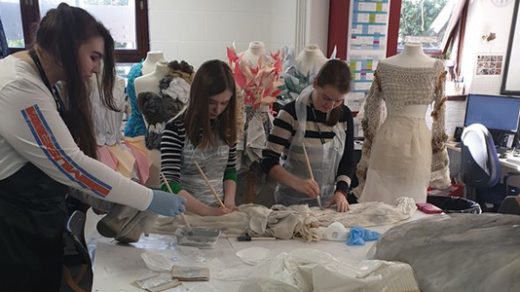World of Work

At the end of each academic year, hundreds of thousands of students receive their GCSE and A Level results and exit the school gates for the last time. Many go on to further education or training and others enter straight into the World of Work. Having studied hard for their qualifications, the next generation of workers are ready to dive into employment and become the professionals of the future.
But are they?
Despite academic achievements, a significant proportion of young people are still not fully prepared for the World of Work. From knowing what to expect on a day to day basis to impressing in an interview, there seems to be a lack of understanding amongst young people as to what the World of Work requires of them, which comes as a direct result of a lack of work experience and careers guidance.
Research from the UK Commission for Employment and Skills found that 66% of businesses believe work experience to be crucial when recruiting new staff. Employers also comment on a lack of ‘soft’ skills such as communication and interpersonal skills as well as management and leadership traits. Whilst young people may leave school with excellent academic achievements, employers are increasingly placing equal emphasis on skills and looking to employ people with relevant practical experience.
The reality results in a difficult catch 22 situation: young people can’t get a job without work experience but they can’t get work experience without a job. It’s clear that the issue of employability, and matching academic education with practical, skill-based learning, needs to be tackled whilst students are still in full time education. After all, it is expected that 14 million jobs will open up in the next decade – including a substantial amount in the digital sector which are yet to even exist – so it’s imperative that school leavers are equipped with the necessary skills to fulfil these roles.
Hot on the heels of examinations, the government recently launched the WE Can campaign: an initiative which will bring together thousands of young people and some of the biggest businesses in the country. So far, 30 national businesses and 12,000 young people have joined the campaign which will provide opportunities and practical advice on securing work placements and how to make the most of work experience. Run by youth ambassadors, WE Can encourages young people to take ‘workies’, the work version of selfies, to demonstrate to friends at school how work experience has helped them.
“We are launching the WE can campaign to give young people practical advice about making the most of their summer holidays – and beyond – to gain valuable business skills,” says employment minister Priti Patel. “This one nation government wants young people to be at the forefront of the opportunities to get the best start in life.”
Whilst a campaign run by young people for young people, and which taps into youthful trends such as selfies, certainly sounds like a good basis for higher levels of engagement with the World of Work, it risks becoming too much of a gimmick. Longevity and quality control is what is needed when it comes to successfully preparing young people for the World of Work.
So where does the responsibility lie in making sure young people access quality work experience? Do businesses need to be more readily engaged? Should the government set out more stringent guidelines for schools? Or should intermediary organisations take the reigns and bridge the gap between schools and businesses?
Realistically, the responsibility should not solely lie with schools, businesses or intermediary organisations, but greater collaboration between them is needed to ensure that work experience is available to all students. Since work related learning was made non statutory and its assigned funding removed, not every secondary school student is given the opportunity to go on a work experience placement. As a result, there is an increasing disparity between students who benefit from quality work placements and those who leave school with little to no experience of the World of Work.
Furthermore, access to work experience has been likened to a ‘postcode lottery’ in that it can vary considerably depending on region. Liverpool, along with Greater Birmingham, has a higher proportion of employers offering work experience placements than in other parts of the country which are in keeping with the city’s lower level of youth unemployment. Councillor Nick Small, assistant mayor and cabinet member for education, employment and skills says, “There’s some amazing work going on in Liverpool schools, but there’s much more we can and should be doing. It’s really important that students are fully prepared for the World of Work and it starts with making the curriculum more relevant to employment and listening to employers about what skills they want.”
Although non statutory, the majority of secondary schools in the Liverpool city region offer at least one work placement and the opportunity is normally opened up to students in Year 10 or 12. In terms of setting up work experience placements, students typically register their interest in a particular area and are then matched up to a suitable employer by a member of staff, or in some cases they may need to find their own placement. They then spend one to two weeks in the workplace learning how their chosen business works.
Depending on both the nature of the work and the level of engagement from the employer as well as the willingness of the student, these placements have the potential to give young people a valuable insight into the World of Work. The most successful work placements can have a huge impact in validating a young person’s career choices, motivating them to work harder in school and can even help establish links for the future. However, less successful placements can be viewed as little more than a box ticking exercise for schools with no long term value for the student.
One school taking the initiative to engage with local businesses is Archbishop Blanch, which recently launched a campaign calling for businesses to help their students become ‘career ready’. Archbishop Blanch School is urging businesses to get involved by signing up to its new programme which hopes to create links between students and local employers. In conjunction with nationwide charity, Career Ready, students from the sixth form will enrol on a programme that gives them the opportunity to receive mentoring, take master classes, undertake internships and visit businesses.
“The Careers Ready programme is a fantastic opportunity to help students grow in confidence and gain essential skills for work,” says Ellie Jones, careers co-ordinator at Archbishop Blanch School. “It also offers employers the chance to have a real positive impact on students‚” lives, share their business credentials to a wider community, and who knows, perhaps find some future talent for their company!”
Depending on each school’s resources and budget, students may be assigned an in-house careers advisor to begin to explore their career prospects early on in their education. Notre Dame Catholic College runs a careers education programme which offers students career advice throughout their time at the school.
Students as young as eleven are encouraged to consider their personal qualities and attributes as well as researching those required for various job roles. Year 9 students focus on decision making and preparing to make informed choices for GCSE options and, during Years 10 and 11, students are encouraged to think about employability skills, including CV writing and interviews, as well participating in a work placement after examinations.
In sixth form, students complete a second work experience placement which is relevant to their chosen career path. Notre Dame Catholic College has been awarded a Careers Quality Award in recognition of the range and quality of the school’s careers related activities, which supports the notion that the earlier young people begin to prepare for the World of Work the higher the chance of employability.
But what measures do schools without dedicated careers advisors take to ensure their students are given relevant guidance and access to work experience placements? This is where external bodies are crucial in stepping in and relieving the pressure on both schools and businesses. There are numerous organisations across the North West which bring together schools and businesses and secure work placements for students.
One of the most widely recognised in the Liverpool city region is Liverpool Compact Education Business Partnership, which organises 2000 placements for 14 to 18 year olds each year. Liverpool Compact negotiates the annual work experience calendar as well as offering enterprise days, workshops and professional development opportunities. Importantly, Liverpool Compact also facilitates post placement analysis and provides employers with a feedback form to comment on the student’s work during their placement.
“Partnerships between education and business have consistently shown their value in Liverpool to provide a valuable and necessary bridge from school to the world of work and to enable young people to learn the skills, qualities and attributes that the business world requires from new young recruits,” says Mike Corley, chief executive of Liverpool Compact. “Our programmes not only provide work-based learning experiences but greatly strengthen career information advice and guidance. They also open the eyes and minds of young people to see the relevance of their studies and how these are reflected in real environments outside school.”
Earlier this year, Liverpool Compact teamed up with St John Bosco Arts College to organise a careers event which aimed to challenge gender stereotypes in the World of Work. Liverpool Compact invited high achieving female professionals from industries that are traditionally perceived as male to the school to inspire students and highlight the different career options open to them and where their qualifications could lead them. As well as hosting students for work experience, this event is an alternative example of how businesses can support students by entering into the school environment instead.
In a similar vein, Merchant Taylor’s hosted a careers event whereby professionals from a variety of industries were invited to attend a morning of mock interviews. Sixth form students were matched to professionals from disciplines related to their chosen career paths, asked questions as if it were a real interview, and then given feedback by the employers on what they did well and how they could improve.
Setting up events where students can engage with professionals is extremely valuable for young people, many of whom are yet to have any practical experience of the World of Work. Mock interviews can prove particularly useful; after all, if young people do not know how to correctly present themselves in front of a panel of employers, they are unlikely to progress past the initial interview stage.
Offering a range of different opportunities is vital in getting as many employers involved in supporting young people in their career choices. It is easy to argue that supporting the future generation of workers falls under corporate social responsibility and therefore all employers should participate; indeed, when statistics show that two thirds of employers consider work experience to be crucial but only around 50% actually offer placements, it’s clear that businesses could take a more active role.
However, some enterprises do not have the capacity to accommodate work placements and strict health and safety rules as well as other legal aspects can be off putting for employers. From a business point of view, it can be difficult to support a student as well as navigating the day to day pressures of the workplace.
Sefton Education Business partnership prides itself on easing the pressure on both schools and businesses when organising work experience placements. “We have a number of staff qualified to be able to carry out the health, safety and welfare checks, and we are a massive source of support should there be an issue during the time of work experience due to our extensive experience, knowledge and passion,” says Joanne Huddart, programmes manager at Sefton Education Business Partnership.
Joanne believes in sharing the responsibility to ensure that the Liverpool city region continues to be a lead in preparing young people for the World of Work, saying, “we need to build resilience, increase confidence and support them in realising exactly what this very different world expects from them. It is our collective responsibility to ensure that no young person is left behind or ill prepared and the earlier we embark on this journey, the better.”
So how early is too early? With schools introducing careers education as early as Year 7, could it be worth incorporating it into primary education too? At this young age, children will not be able to fully grasp the concept of a career or understand the importance of possessing employability skills, but they could certainly benefit from a trip to the workplace where they could get a feel for the environment and be introduced to different industries. Many children would revel in the opportunity to sit at a desk with a computer and spin around on office chairs, and this brief insight could be enough to spark an interest which would lead them through secondary school and beyond.
With the help of organisations and local businesses, schools across the Liverpool city region are making great strides in providing students with varied opportunities to experience the World of Work. From work placements to business events and career fairs, secondary school students are actively encouraged to look beyond the milestones of GCSE and A Levels and to think about the skills they will need in order to become the successful workers of the future.



